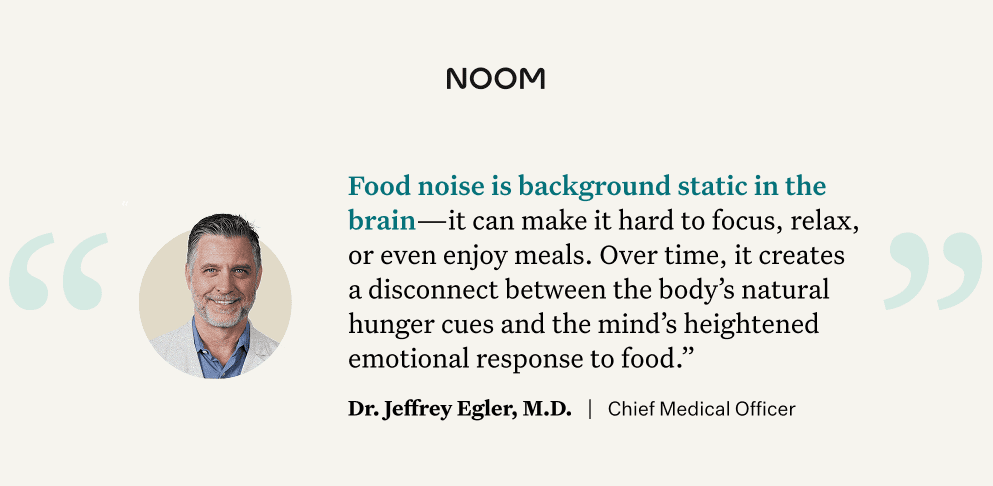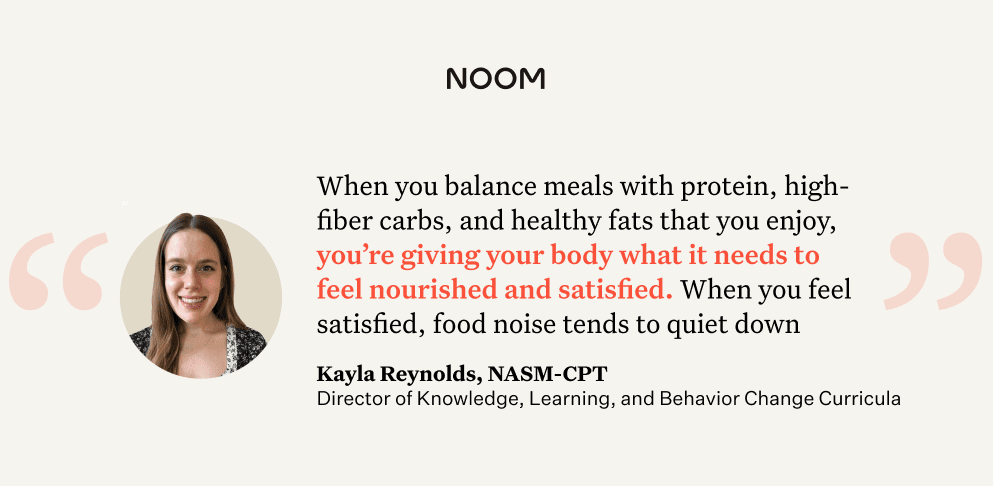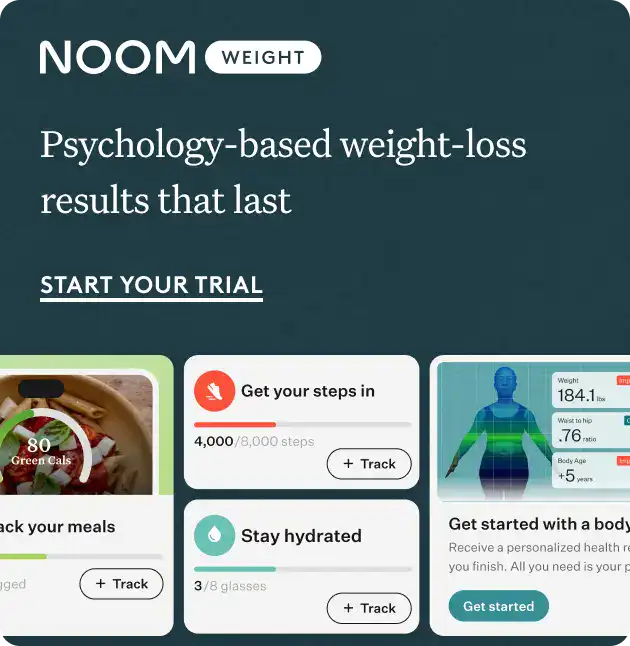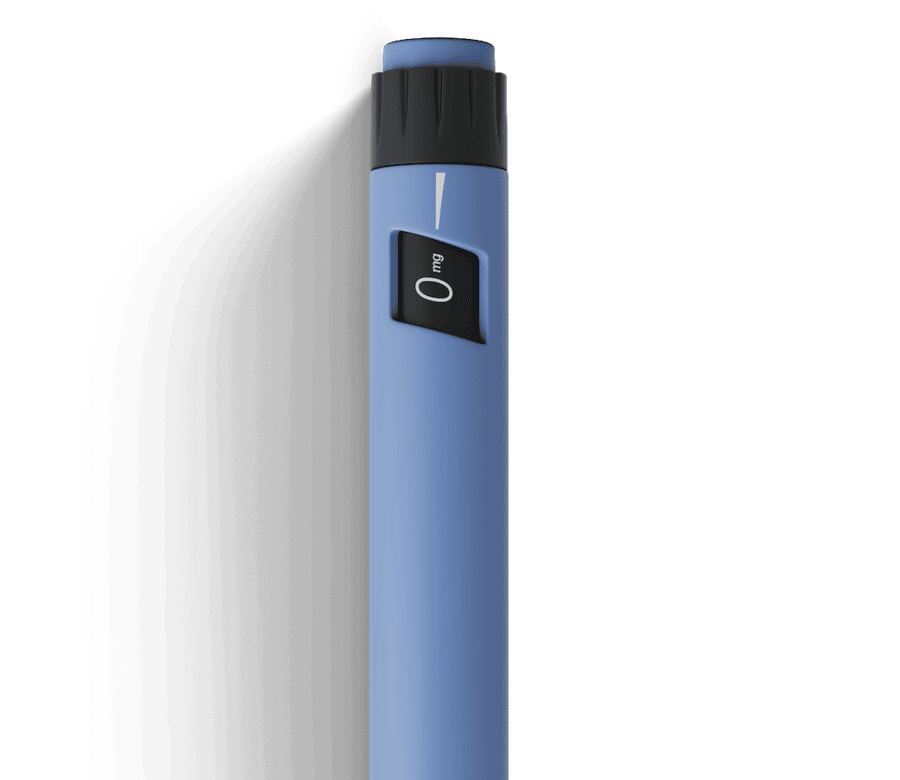Food is everywhere these days—on our screens, in our kitchens, and just a tap away on a delivery app. So it makes sense that we think about it a lot. But for some people, those thoughts become constant or overwhelming.
This kind of mental chatter—like always planning your next meal, dealing with intense cravings, or feeling distracted by food—is known as food noise. And when it gets loud, it can make it harder to tell the difference between true hunger and the urge to eat just because food is top of mind.
A review in Nutrients offers a helpful way to understand what’s really going on. It explains food noise as your brain becoming more sensitive—and more reactive—to food triggers like smells, emotions, stress, or even boredom. When that happens, thoughts about eating can pop up constantly, even if you’re not actually hungry. And over time, that mental noise can make it harder to stick with healthy choices or recognize when you’ve had enough.
“Food noise is background static in the brain—it can make it hard to focus, relax, or even enjoy meals,” says Dr. Jeffrey Egler, MD, Chief Medical Officer at Noom. “Over time, it creates a disconnect between the body’s natural hunger cues and the mind’s heightened emotional response to food.”
Food noise can look like constantly planning your next meal, grazing all day, or obsessing over what you just ate, even when you’re physically full. It’s not about willpower; it’s about biology. Stress, habits, and the environment you’re in, and a range of factors can cause it.
“People often confuse food noise with true hunger, which can lead to overeating or making unhealthy food choices,” says Kayla Reynolds, NASM CP, Director of Knowledge, Learning & Behavior Change Curricula at Noom. “Learning to pause, check in with your hunger, and ask your body what else it might need (emotional support, stimulation, etc) is a powerful first step in breaking the cycle.
While some people report a quieting of food noise on medications like GLP-1 receptor agonists, there are also natural ways to turn the volume down. We’ll explore what causes food noise, how it shows up in daily life, and the most effective ways to quiet it, without medication.

The causes of food noise
If you feel like food thoughts are taking up too much space in your mind, there’s a reason. Food noise is shaped by how your brain, body, and habits respond to your environment. The more you understand what’s driving it, the more power you have to quiet it. Let’s take a look at the various causes:
- Biology: Your body has a built-in system for managing hunger and fullness. It includes areas of the brain that respond to physical hunger, emotional triggers, and decision-making around food. But stress, lack of sleep, skipping meals, and more can all impact this system, skewing your hunger cues and often making food noise louder. One review highlights how the gut and brain constantly send messages back and forth. When that connection is out of sync, it can increase cravings and make it harder to feel full. So what’s the difference between food cues and food noise?
- Food cues are the signals that remind you of food or spark a craving. They can be external (like seeing a commercial) or internal (like feeling low energy).
- Food noise goes beyond those cues. It’s the constant, intrusive mental chatter about food. If you’re always planning your next meal, fighting off obsessive cravings, or thinking about eating even when you’re not physically hungry, that’s food noise. It can feel like food has taken over your thoughts.
- Genes: Some people are naturally more sensitive to taste or food rewards, which can make food noise feel stronger. A study in Genes & Nutrition explains how genetic differences can shape appetite, food preferences, and even how satisfied you feel after eating.
- Hormones: Certain hormones can increase food noise. When they’re out of balance, cravings and intrusive food thoughts can take over.
- Ghrelin, the “hunger hormone,” increases when you’re stressed or haven’t eaten in a while.
- Leptin, the “satiety hormone,” tells your brain you’re full, but some people become resistant to it, so the signal doesn’t land, keeping food noise turned on, even after eating.
- Insulin helps regulate blood sugar, but insulin resistance can make your brain more sensitive to food noise.
- Cortisol, the stress hormone, can drive cravings for comfort foods. Chronic stress keeps it elevated. One review links long-term stress to higher calorie intake and reduced control around food.
- Dopamine is tied to reward and pleasure. Some research suggests that medications like semaglutide (a GLP-1) may reduce food noise by calming overactive dopamine pathways.
- Your environment: Food noise isn’t just internal—it’s also triggered by what’s around you. Things like food ads and restaurant or grocery store smells can make your brain light up with anticipation. Researchers call this “cue reactivity,” and it’s a key part of what keeps food noise going.
- A Nutrients review introduced the CIRO model (cue, influencers, reactivity, outcome), showing how your surroundings and internal stress levels can intensify food thoughts, especially when your brain is already primed to react.
- Restrictive dieting can cause food noise. A study explains how extreme calorie cutting raises hunger hormones like ghrelin and slows your metabolism, which can lead to stronger cravings and more obsessive food thoughts.
- Emotions: Stress, boredom, and anxiety can all lead to more thoughts about food. Over time, your brain starts to connect food with comfort, even if you’re not physically hungry. That’s part of why food noise can feel automatic.
- Emotional triggers, diet culture, and even shame around eating can make food noise worse, especially if you’re trying to resist food all the time.
- Rigid food rules and guilt can create more mental chatter, not less.
Other habits that might keep food noise going
Even non-food habits can turn up food noise:
- Lack of sleep raises ghrelin and lowers leptin. One study shows that even one poor night of sleep can increase cravings and reduce self-control around food.
- Inactivity affects insulin sensitivity and stress hormones. Moving regularly—even walking—can help regulate hunger and reduce food urges.
- Eating with distractions. A study found that sound, like background music, can alter how we experience food and lead to longer meal times. These sound cues may reduce attention to eating, which can increase impulsive eating behaviors, especially in people who already struggle with self-control around food.
Food noise is your body’s way of responding to stress, unmet needs, or a system out of balance. Even seemingly unrelated stressors like work pressure, financial worries, or relationship challenges can heighten this internal chatter, as your body may seek comfort or distraction through food. But with the right tools, like steady meals, targeted stress management, better sleep, and more awareness of your cues, it is possible to quiet the noise and reconnect with what your body truly needs.
Natural strategies to help stop food noise
Food noise can feel relentless—but it doesn’t have to run the show. While there’s no single fix, research shows that science-backed, natural strategies can help quiet the mental chatter and help you rebuild a calmer, more balanced relationship with food.
From how you shape your environment to what you put on your plate, small changes can make a big difference. These habits don’t just support your physical health—they help retrain your brain to focus less on food and more on what matters to you.
Let’s start with your environment. Where and how you eat, what you keep in your kitchen, and even what you see on your social feed all shape your experience with food.
How to manage your environment
Your surroundings shape your eating habits more than you might realize. Reducing food cues and distractions can help dial down cravings and mental chatter.
- Keep tempting foods out of sight. A study found that simply reducing the visual presence of highly palatable foods in your kitchen can lower cravings and reduce mindless snacking.
- Set social boundaries around food talk. Conversations that center heavily on dieting or food can heighten food focus. One study found that frequent food-related conversations in social settings can worsen preoccupation with food.
- Limit food-heavy content online. Research in Nutrients shows that ongoing exposure to food imagery and ads heightens cue reactivity and makes food thoughts harder to manage. Consider unfollowing accounts that you notice trigger food noise.
- Create a calm, distraction-free space for meals. Background noise and multitasking while eating are linked to lower satisfaction and higher impulsive eating.
Your space should support your goals. Curating your kitchen, media, and mealtime environment can lower food noise and help you reconnect with real hunger.

How diet can quiet food noise
A balanced, consistent diet helps regulate appetite hormones and reduces the biological drivers of food noise.
- Choose whole, unprocessed foods. Choose nutrient-rich options like vegetables, fruits, whole grains, lean protein, nuts, and healthy fats. These help balance blood sugar and reduce cravings. These foods help regulate appetite and reduce the cycle of cravings.
- Get enough protein and fiber. The NIH (National Institutes of Health) says that 10 to 35% of your daily calories should come from protein to promote fullness and control appetite. Fiber also helps regulate digestion and satiety hormones.
- Include healthy fats. Not all fats are the same. Monounsaturated and polyunsaturated fats (found in olive oil, avocados, nuts, and fatty fish) help you feel full and support your metabolism. Healthy fats help stabilize energy and promote fullness.
- Stick to regular meals. Skipping meals or eating inconsistently can throw off hunger hormones. There’s no perfect schedule, but consistency helps. Most people find that eating every 3 to 4 hours or having three balanced meals a day supports steady energy and keeps hunger hormones in check.
- Stay hydrated. While it’s not a cure for food noise, hydration helps keep your body’s signals aligned.
Eating in a way that supports your biology can make it easier to hear—and trust—your hunger and fullness cues.
“When you balance meals with protein, high-fiber carbs, and healthy fats that you enjoy, you’re giving your body what it needs to feel nourished and satisfied. When you feel satisfied, food noise tends to quiet down,” says Reynolds.
How exercise can help improve food noise
Regular physical activity is a powerful tool to manage appetite and reduce the mental chatter of food noise.
- Exercise helps regulate hunger hormones. Research shows intense workouts can reduce ghrelin (your hunger hormone) and increase PYY, a hormone that promotes fullness, actively turning down food noise-related urges.
- Improves metabolic sensitivity: Consistent movement enhances your body’s sensitivity to hormones like leptin and insulin. When these systems function optimally, your brain receives clearer signals of fullness, which can significantly reduce constant preoccupation with food.
- Shifts mental focus: Beyond hormonal effects, exercise provides a powerful mental distraction from intrusive food thoughts and cravings. This mental reset helps make food less of an overwhelming focus and more of a mindful choice.
Remember, enjoyment is important, too! Whether it’s walking, dancing, or lifting weights, consistency matters more than intensity.
How managing stress can quiet food noise
Chronic stress is a known driver of cravings, emotional eating, and food noise.
- Practice deep breathing or meditation. These habits activate your relaxation response and help lower cortisol, the stress hormone linked to increased appetite.
- Try yoga. A review found that yoga can improve emotional regulation and reduce uncontrolled eating.
- Spend time in nature. Time outside lowers stress, blood pressure, and the emotional triggers that may increase food noise.
- Engage in enjoyable hobbies. Leisure activities and physical movement help lower stress and can provide a distraction from thoughts about food.
Managing stress isn’t just good for your mood—it helps bring your appetite back into balance.
Getting good sleep can reduce food noise
Sleep affects every system that regulates hunger and cravings. Aim to get 7 to 9 hours of quality sleep. Poor sleep increases ghrelin and decreases leptin, which can cause you to think more about food since you’re hungry.
Here are some tips for getting better sleep:
- Stick to a consistent sleep schedule. Going to bed and waking up at the same time supports hormone regulation.
- Create a calming bedtime routine. Avoiding screens and bright lights before bed can help reduce cortisol and improve rest.
- Optimize your sleep space. A cool, dark, quiet room with minimal disruption helps your brain and body recover.
Good sleep doesn’t just make you feel better—it can actually help quiet your brain’s drive to over-focus on food.
Rx weight loss, the right way, with Noom
Get access to prescription weight loss medication with Noom.When to see a doctor for food noise
Natural strategies can go a long way in managing food noise, but sometimes, extra support makes all the difference. If food thoughts are taking over or you’re feeling overwhelmed, it’s okay to ask for help. Knowing when to reach out is an important part of building a healthier, more peaceful relationship with food.
You might benefit from professional support if:
- Food thoughts are interfering with your daily life. If you’re constantly distracted by food, struggling to focus, or unable to enjoy things you used to, it’s a sign that food noise may need more than self-guided strategies.
- You feel anxious or distressed around food. Ongoing worry about eating, weight, or body image can wear you down—and may signal deeper emotional drivers that need attention.
- Your weight is changing in concerning ways. If you’re gaining or losing weight despite balanced habits, a doctor or dietitian can help you rule out underlying issues.
- Eating is affecting your relationships. When food starts creating tension with family, friends, or partners, it’s time to check in with a professional.
- You notice disordered patterns. Binge eating, extreme restriction, or compensatory behaviors like purging are serious signs that deserve immediate care.
Who to turn to:
If food noise is impacting your health, mood, or quality of life, you don’t have to go it alone. Here are a few experts to reach out to:
- Registered dietitian nutritionists (RDNs): These food and nutrition experts can help you build flexible, satisfying meals, correct nutrient gaps, and reconnect with real hunger and fullness.
- Therapists or psychologists: Mental health professionals who specialize in eating behaviors can help unpack emotional eating, stress triggers, and diet culture patterns. They can also teach cognitive strategies to help quiet food noise.
- Doctors or psychiatrists: Medical providers can check for hormonal imbalances, metabolic concerns, or mental health conditions that may be contributing to food noise. They can also refer you to the right specialists for additional support.
Can GLP-1 medications stop food noise?
For some, food noise is driven by deeper biological signals that require more targeted support. GLP-1 medications designed for weight loss, like Wegovy® (semaglutide) and Zepbound® (tirzepatide), have been shown to reduce food noise. These medications can lower appetite and promote satiety by activating receptors that slow digestion and influence parts of the brain that control appetite and reward signals.
These medications work best when combined with all of the lifestyle changes we’ve mentioned, like regular movement, balanced nutrition, mindful eating, stress management, and improved sleep patterns.
If food noise feels overwhelming despite your best efforts, know that additional tools and expert support are available—and finding the right combination can help quiet the mental chatter for good.
If you qualify for Noom Med, you’ll be connected with a clinician who can evaluate your needs, prescribe weight-loss medications if appropriate, and guide sustainable lifestyle changes.
Supplements and food noise: What works
When you’re browsing the supplement aisle, it’s easy to get drawn in by bold promises—especially those claiming to help with appetite or food noise. But just because a product says it works doesn’t mean there’s solid science behind it.
New options are always hitting the market, and some show promise. But it’s smart to do a little digging—and even smarter to check in with your doctor or a qualified healthcare provider. They can help you figure out if a supplement has real evidence behind it and whether it makes sense for your body and your goals.
Here’s what the research says about some of the most talked-about supplements:
- Chromium picolinate: A trace mineral commonly found in multivitamins and standalone supplements for blood sugar support. It may help regulate blood sugar, which could indirectly influence appetite or food noise. While some early research shows potential, including improvements in insulin sensitivity, there isn’t enough strong or long-term evidence to recommend it for appetite regulation alone.
- Berberine: A plant compound found in herbal supplements, often derived from barberry, goldenseal, or Oregon grape. Marketed for blood sugar control and weight loss, it may support glucose regulation, which could help quiet food noise for some, but it hasn’t been proven to directly curb appetite.
- Bitter hop extract: A botanical extract sourced from hops (the same plant used in beer brewing), often found in appetite control or digestive health supplements. A study found it might reduce appetite and cravings during fasting periods, possibly by acting on gut hormones—but it’s still early-stage research, and more data is needed before drawing conclusions.
- Adaptogens like ashwagandha and rhodiola: Herbal extracts found in stress-relief supplements and teas. These herbs are better known for helping the body manage stress, not suppressing appetite. That said, their calming effects may help reduce stress-driven eating, which may indirectly minimize food noise.
“Supplements can sometimes offer gentle support, but they’re not a replacement for the bigger work of managing food cues, stress, and lifestyle,” says Dr. Egler.
Even the most promising supplements work best when paired with healthy habits like balanced meals, regular movement, stress reduction, and adequate sleep.
If a supplement promises fast, effortless appetite control, it’s worth finding out if science supports it.
The bottom line: How to manage food noise
Food noise isn’t just about cravings—it’s the result of a complex mix of biology, stress, habits, and environment. But you can make real progress by working with your body, not against it.
Consistent changes—like eating balanced meals, managing stress, moving your body, and getting enough sleep—can help reset your hunger signals and quiet the constant mental chatter around food. Over time, these habits help you recalibrate your body and quiet food noise.
And when food noise feels overwhelming, support matters. That might mean talking to a dietitian, therapist, or doctor, or using tools that guide you toward healthier habits every day.
Noom is built to support this kind of lasting change. With science-backed behavior tools, personalized coaching, and whole-person support, you’ll learn how to tune into your body, reduce food noise, and build a relationship with food that feels good.
You don’t have to silence every thought, but you can turn down the volume and make room for a more confident way of eating.
Editorial standards
At Noom, we’re committed to providing health information that’s grounded in reliable science and expert review. Our content is created with the support of qualified professionals and based on well-established research from trusted medical and scientific organizations. Learn more about the experts behind our content on our Health Expert Team page.




































